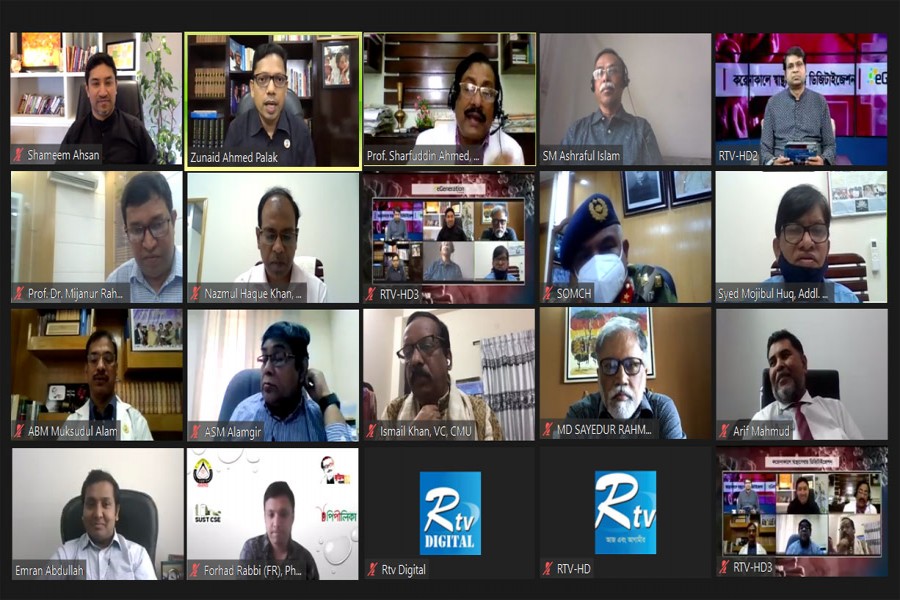To address how the health system in our country can thrive and sustain amid this global pandemic and beyond, eGeneration organised a webinar titled "Digital Healthcare Amid COVID Pandemic".
The webinar was organised in partnership with RTV, and it was joined by government representatives and healthcare experts from the leading public hospitals in the country, according to a statement.
Zunaid Ahmed Palak, state minister, ICT Division, joined the webinar as the chief guest along with special guests Professor Dr Md Sharfuddin Ahmed, vice-chancellor, Bangabandhu Sheikh Mujib Medical University (BSMMU); and Professor Ismail Khan, vice-chancellor, Chattogram Medical University.
SM Ashraful Islam, executive vice chairman, eGeneration Limited presented the keynote during the webinar. The session was chaired by Shameem Ahsan, managing director, eGeneration.
Zunaid Ahmed Palak expressed the expectation that the country's medical sector will be completely technology dependent by 2025 and every hospital in the country will be run centrally through technology.
He further said, “Electronic Health Records (HER) through Centralized Health Management Service software should use an interoperable system of information exchange between public and private sector stakeholders so that every citizen can digitally preserve his or her health records to avail a seamless health service.”
Shameem Ahsan focused on how the healthcare sector has been tackling the current pandemic admirably and adopting technology in a breathtaking pace. He added, “One of eGeneration’s missions is to ensure people’s well-being, alleviate pain and reinstate health by leveraging technology. We want to help the public and private hospitals in the country prevail against this pandemic with the aid of technology solutions such as ICU over the Cloud, Telemedicine, Tele-radiology, Hospital Management Information System, AI-based Chatbot etc.”
Professor Sarfuddin Ahmed said, “The development of technology is saving us financial and time. Even though all the universities are closed during this period, we are taking classes digitally. We have come to serve many patients through telemedicine. The suffering of patients standing in line to get services has been eliminated a lot.” He added that all upazila levels, including universities, should be digitalised through automation.
Professor Dr Mohammad Ismail Khan shared how everyone can see the benefits of Digital Bangladesh and how digital services have become part of almost all sectors – including the health sector. He also said, “In order to build skilled professionals in the health sector, first we need to analyse the requirements, then we have to start working from the education level to build skilled human resources according to the needs of that sector. Only a combination of skilled health professional and digital healthcare solutions can bring maximum success in this sector.”
Syed Ashik Rahman, CEO of RTV and the moderator of the webinar said, “By utilising the capabilities of information technology in the medical sector, it will be possible to provide the necessary medical services and advice to people across the country. This can greatly reduce the risk of possible infections and save the lives of many people.”
SM Ashraful Islam underscored the challenges in providing healthcare services stemming from lack of medical professionals worldwide. He said, “Technology tools can bridge the gap between demand of medical services and our capacity to give the needed services. We have already deployed the National Covid Dashboard, which was designed by leading experts from health and IT sector. eGeneration has different digital services like Electronic Health Record (EMR), Hospital Management Information System (HMIS), Telemedicine and Machine Integration that can improve the capacity, efficiency and productivity of the healthcare sector to alleviate pain of the patients and healthcare professionals.”
Nazmul Haque Khan, additional secretary, Hospital Wing, Health Ministry said “Our health system has flourished over the years. To bring automation and digitalisation to the health sector, we are finalising the Digital health Strategy. This will help us bring health services to all the citizens of our country.”
Professor Sayedur Rahman, chairman, Pharmacology Department, Bangabandhu Sheikh Mujib Medical (BSMMU) said, “At the beginning of the epidemic, we have fully digitalised our institute using virtual outdoors system. There have also been virtual round arrangements for the patients in BSMMU. In order to increase the quality of health services for the people of this country, preparations are underway to create a digital health system with international standards.”
Brig Gen Brayan Bangkim Halder, director, Sylhet MAG Osmani Medical College Hospital said “We are going through such a global pandemic that people cannot come to hospital avail healthcare. Mobile apps and mHealth has helped us to provide health services in this trying times. We need an interoperable Electronic Health Record (EHR) in hospitals now. This will enable us to share patients’ history with other doctors and consult among doctors from various institutes, be it inside Bangladesh or abroad.”
Prof ABM Muksudul Alam, principal, Shaheed Suhrawardy Medical College (ShSMC); Prof Dr Mijanur Rahman, director, MIS, DGHS; Dr ASM Alamgir, principal scientific Officer (PSO), IEDCR; Dr Md Toufiq Hassan Shawon, medical officer, DGHS; and Dr Md Forhad Rabbi, associate professor, Computer Science and Engineering Department, Shahjalal University of Science and Technology were also present during the webinar among others.


